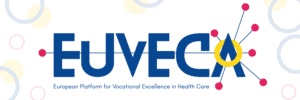Challenge
The sustainability of the European health care sector is challenged by 6 mega trends, namely:

EUVECA’s aim is to address six so-called megatrends which were presented in the last article on 21st-century skills. The first one we will take a closer look at is the ageing population. The ageing population brings forth a range of considerations, and it is crucial to promptly address them to foster effective resolutions and gain insights into the underlying reasons and the significance of considering this matter. In this article, we explore the connection between our project and the ageing population, emphasising the importance of upskilling and its role in addressing these challenges seamlessly.
The proportion of the global population aged 60 and above is projected to rise in almost every country worldwide between 2015 and 2080. As a result, population ageing is expected to have a negative impact on both workforce participation and savings rates, raising concerns about potential future economic growth slowdowns (1). According to the WHO, the number of people aged 60 years and older outnumbered children younger than 5 years in 2020. At an older age, individuals commonly encounter various conditions simultaneously, including hearing loss, cataracts, refractive errors, back and neck pain, osteoarthritis, chronic obstructive pulmonary disease, diabetes, depression, and dementia. The likelihood of experiencing multiple conditions concurrently increases with older age (2). Further, the survival rates for cancer continue to improve, and therefore, effective management of comorbid conditions becomes increasingly vital. Simultaneously, it remains imperative for general physicians to possess comprehensive knowledge of prevalent cardiovascular conditions like heart failure and hypertension (3). Nowadays, an increasing number of individuals are being impacted by chronic illnesses like diabetes and cardiovascular diseases. The ageing population and lifestyle choices are recognised factors contributing to this phenomenon. Consequently, individuals require care for a substantial duration of their lives.
As the population ages, the demand from older people increases, requiring more and often increasingly complex healthcare services, while the number of people in the workforce decreases. As a result, there will be fewer staff and less public funding to meet the need and demand for high-quality care. EUVECA has recognised the significance of educating and educating healthcare professionals on 21st-century skills so that they can effectively address the challenges presented by a rapidly growing, ageing population. In the future, it will be crucial for patients with chronic diseases and comorbidities to be more actively engaged, take responsibility, self-monitor and continuously communicate with healthcare professionals.
EUVECA is well aware of this mega trend and our objective is to support the necessary innovation and development of the healthcare sector by ensuring the provision of future-oriented skills within the sector. The greying population in the EU is only one of the future megatrends to which the project pays great attention. Stay tuned and subscribe to our newsletter to find out more about the other five megatrends that EUVECA is addressing.
Sources
(1) Economics Aspects of Ageing Population: https://www.sciencedirect.com/science/article/pii/S221256711500492X
(3) The ageing population in healthcare: a challenge to, and in, the workforce: https://www.ncbi.nlm.nih.gov/pmc/articles/PMC6297645/
 The growing importance of chronic disease and co-morbidity in patient care settings is related both to demographic trends and to lifestyle factors such as sedentary routines and unhealthy dietary habits.
The growing importance of chronic disease and co-morbidity in patient care settings is related both to demographic trends and to lifestyle factors such as sedentary routines and unhealthy dietary habits.
 The Information Technology Revolution and general digitalisation of society, which is related to the introduction, adoption and uptake of health care technologies, the use of big data and artificial intelligence, wearables and mobile devices for monitoring and data collection.
The Information Technology Revolution and general digitalisation of society, which is related to the introduction, adoption and uptake of health care technologies, the use of big data and artificial intelligence, wearables and mobile devices for monitoring and data collection.
 There is an ongoing transition from technology to biology, as new innovations have led to an increased uptake of microbiological treatments. Continued advancements in genetic engineering and biotechnologies will shape the future of personalised care and prevention strategies, requiring new approaches to skills development within the health care sector.
There is an ongoing transition from technology to biology, as new innovations have led to an increased uptake of microbiological treatments. Continued advancements in genetic engineering and biotechnologies will shape the future of personalised care and prevention strategies, requiring new approaches to skills development within the health care sector.
 Patients are becoming more active participants in their own lifelong health journeys through more active involvement in care plans, increased emphasis on personal responsibility and self-monitoring, and closer engagement with health care professionals. The modern health consumer has unprecedented access to health information and the ability to consistently improve their health literacy, and health and care professionals need to be supported so that they can meet increasing patient expectations for dynamic, high-quality, patient-centered care.
Patients are becoming more active participants in their own lifelong health journeys through more active involvement in care plans, increased emphasis on personal responsibility and self-monitoring, and closer engagement with health care professionals. The modern health consumer has unprecedented access to health information and the ability to consistently improve their health literacy, and health and care professionals need to be supported so that they can meet increasing patient expectations for dynamic, high-quality, patient-centered care.
 The health and care sector must play an active role in addressing the climate challenge. The successful implementation of sustainable procurement and resource-use strategies to reduceenergy, water, chemical and plastic use will rely on a well-trained, modern health and care workforce.
The health and care sector must play an active role in addressing the climate challenge. The successful implementation of sustainable procurement and resource-use strategies to reduceenergy, water, chemical and plastic use will rely on a well-trained, modern health and care workforce.


